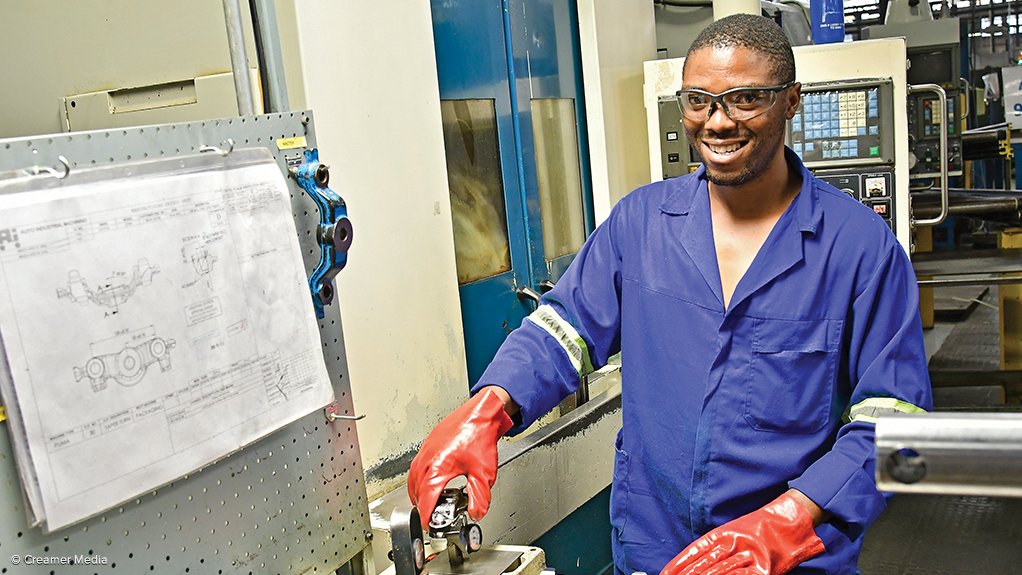Exports can support greater local automotive development


QUALITY WORK Ensuring that buyers gain sufficient value and quality of components and services from the value chain drive demand and local manufacturing
Photo by Donna Slater
Local economic headwinds may potentially be offset by increasing exports under the African Continental Free Trade Area, says industry body National Association of Automobile Manufacturers of South Africa (NAAMSA) CEO Mike Mabasa.
The South African automotive industry currently exports to 155 countries and provides components and vehicles that meet global quality standards. About 60% of exports are to developed international markets, and European countries account for 58% of this.
About 13% of the automotive industry’s exports are into the rest of Africa and the free trade area provides an opportunity for the local industry to explore new markets as part of the African Association of Automobile Manufacturers, he says.
“To meet the ambitious goals of the Automotive Masterplan 2035 to grow the number of vehicles produced in South Africa from 600000 a year to 1.4-million a year, sufficient demand and production capacity are required. Africa is expected to be one of the key drivers to attain this objective and, subsequently, more than double our local manufacturing volumes.”
Any growth into African markets should be done to ensure that the socioeconomic climate in the markets is also boosted such as identifying potential suppliers in the supply chains, including providing materials and/or components for the local automotive manufacturing industry.
“We believe that focusing on supporting the comparative advantages of each country to which the local industry exports, including identifying portions of supply and value chains that can be established within these countries will allow for a mutually beneficial situation for development of the local industry and participants in these markets.”
Additionally, this approach can also help to overcome the problem of grey imports by ensuring that buyers gain sufficient value and quality of services from the value chain to compete against the lower prices of these grey imports.
“This value-chain approach is also set to raise the quality and safety of the vehicles, components and service levels, as well as customer expectations, in Africa. All manufacturers of global automotive brands worldwide have to adhere to global safety and quality standards.”
While price remains a key factor in vehicle purchasing behaviour in Africa, businesses and fleet operators are likely to recognise the value of better services and support, as well as better quality components to ensure their vehicles remain in good operating condition.
This value-driven mindset is expected to grow among consumers, if there is sufficient support and quality of services in these territories.
Further, the automotive and mobility industry’s transition provides ample opportunity for youth, technically skilled people and aspiring business people to enter the industry and provide new services and products.
“Future mobility will provide greater opportunities for new roleplayers to enter the industry in South Africa and in the rest of the continent. Transformation of the industry is critical to adapt to technological changes and, with this, we can also secure local participation in this continuously evolving industry and establish Africa’s role in the global automotive industry,” says Mabasa.
“Given the technological changes and the growth opportunities in the industry, it provides good career options for technically skilled youth and entrepreneurial people who will be challenged to adapt continuously, and provide them with business and technical skills that can be applied across multiple industries and in future digital economies.”
The focus on quality and standards in the automotive industry will also drive similar requirements of digital systems and analytical systems to ensure that health and safety of passengers.
Further, more digital communication channels and customer interactions will also boost the services sector of the automotive industry, such as through notifications for vehicle maintenance and automatic bookings, which will require that workshops and technical operations be linked to digital service platforms and adhere to strict quality standards.
Changes to customer experience and their expectations will accelerate and drive yet further opportunities and business models. These changes will be in addition to the technical and technological changes new propulsion technologies are expected to usher in, including public-charging infrastructure tied to changes in the energy industry in which the automotive industry is expected to play a significant part.
“Mobility is being redefined worldwide. The industry is assessing and adapting to these changes constantly. We encourage young people to participate in the industry as a means to put their skills to use, pursue various career development pathways and in an environment that actively supports skills development in line with current and future demands,” he concludes.
Story highlights:
* Export expansion into Africa may provide a boost to local automotive and component manufacturers.
* Technological changes will drive quality and standards requirements for automotive digital systems and analytical systems to ensure that health and safety of passengers.
Comments
Press Office
Announcements
What's On
Subscribe to improve your user experience...
Option 1 (equivalent of R125 a month):
Receive a weekly copy of Creamer Media's Engineering News & Mining Weekly magazine
(print copy for those in South Africa and e-magazine for those outside of South Africa)
Receive daily email newsletters
Access to full search results
Access archive of magazine back copies
Access to Projects in Progress
Access to ONE Research Report of your choice in PDF format
Option 2 (equivalent of R375 a month):
All benefits from Option 1
PLUS
Access to Creamer Media's Research Channel Africa for ALL Research Reports, in PDF format, on various industrial and mining sectors
including Electricity; Water; Energy Transition; Hydrogen; Roads, Rail and Ports; Coal; Gold; Platinum; Battery Metals; etc.
Already a subscriber?
Forgotten your password?
Receive weekly copy of Creamer Media's Engineering News & Mining Weekly magazine (print copy for those in South Africa and e-magazine for those outside of South Africa)
➕
Recieve daily email newsletters
➕
Access to full search results
➕
Access archive of magazine back copies
➕
Access to Projects in Progress
➕
Access to ONE Research Report of your choice in PDF format
RESEARCH CHANNEL AFRICA
R4500 (equivalent of R375 a month)
SUBSCRIBEAll benefits from Option 1
➕
Access to Creamer Media's Research Channel Africa for ALL Research Reports on various industrial and mining sectors, in PDF format, including on:
Electricity
➕
Water
➕
Energy Transition
➕
Hydrogen
➕
Roads, Rail and Ports
➕
Coal
➕
Gold
➕
Platinum
➕
Battery Metals
➕
etc.
Receive all benefits from Option 1 or Option 2 delivered to numerous people at your company
➕
Multiple User names and Passwords for simultaneous log-ins
➕
Intranet integration access to all in your organisation



















